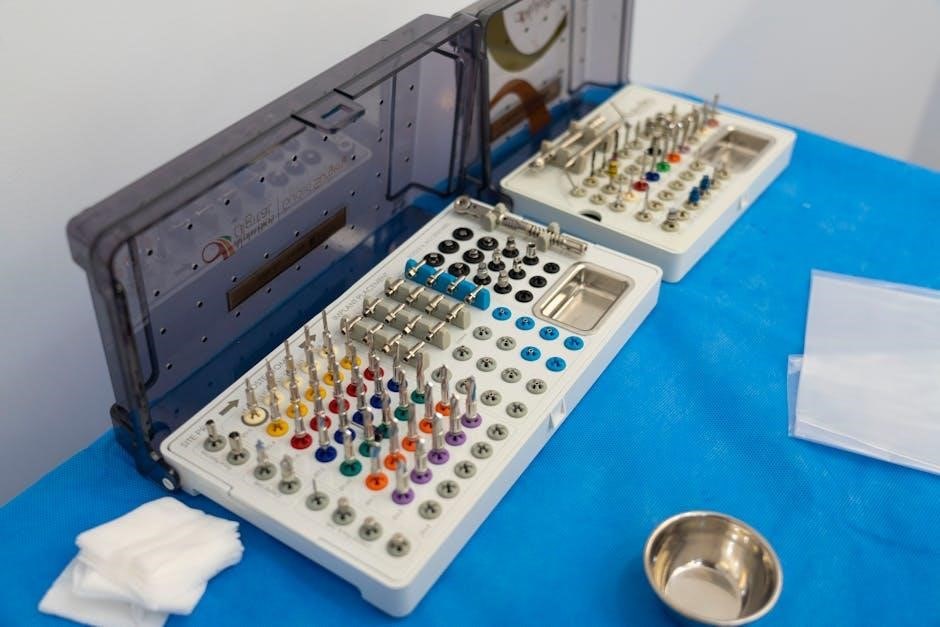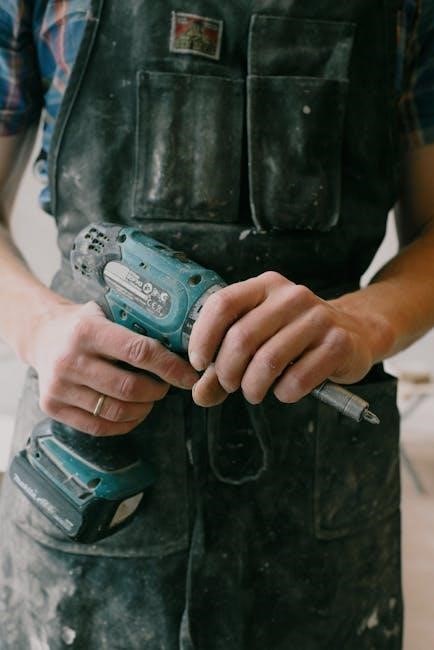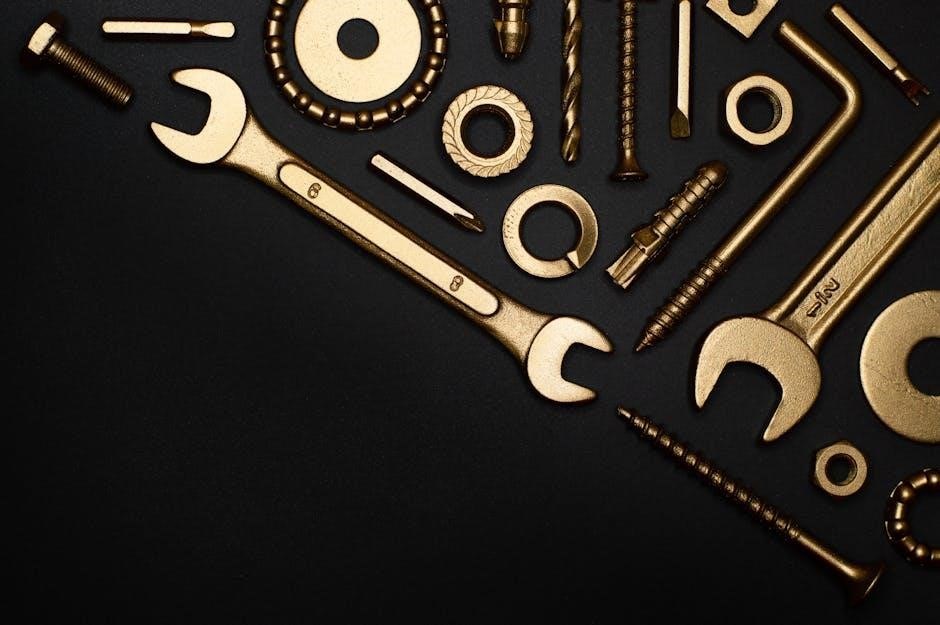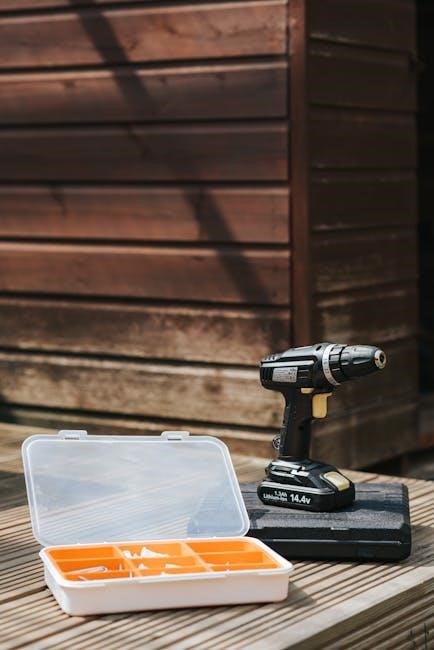Drill bits are essential tools for drilling holes or driving screws in various materials. They come in different types‚ each designed for specific tasks and materials‚ ensuring versatility and efficiency in projects.
1.1 What Are Drill Bits?
Drill bits are cutting tools attached to drills to create holes or drive screws in various materials. They are available in different shapes‚ sizes‚ and materials‚ each designed for specific tasks. From general-purpose drilling to specialized applications‚ drill bits are essential for precision and efficiency in projects. Whether for metal‚ wood‚ or masonry‚ the right drill bit ensures optimal performance and prevents damage to materials or tools. Understanding their types and uses is crucial for achieving professional results in any project.
1.2 Importance of Choosing the Right Drill Bit
Choosing the right drill bit is crucial for achieving precise results and extending tool life. The wrong bit can damage materials‚ reduce efficiency‚ and pose safety risks. Factors like material type‚ hole size‚ and project requirements must be considered. Using the correct drill bit ensures optimal performance‚ minimizes wear and tear‚ and saves time. It also prevents overheating and potential breakage‚ making it essential for professional and DIY projects alike. Proper selection enhances overall productivity and quality of work.

Types of Drill Bits Based on Material
Drill bits vary by material‚ such as high-speed steel‚ carbide‚ cobalt‚ titanium-coated‚ and diamond-coated‚ each optimized for specific drilling tasks and material types.
2.1 High-Speed Steel (HSS) Drill Bits
High-speed steel (HSS) drill bits are versatile and durable‚ suitable for drilling into metal‚ wood‚ and plastic. They are cost-effective and maintain sharpness at high speeds‚ making them ideal for general-purpose drilling. HSS bits are widely used in DIY projects and professional settings‚ offering reliable performance across various materials. Their heat resistance and hardness ensure longevity‚ making them a popular choice for everyday drilling tasks.
2.2 Carbide Drill Bits
Carbide drill bits are highly durable and designed for tough materials like hardened steel‚ stainless steel‚ and titanium. They feature a carbide tip for exceptional hardness and wear resistance. These bits are ideal for heavy-duty applications and maintain their cutting edge longer than HSS bits. Carbide drill bits are more expensive but offer superior performance in demanding environments‚ making them a preferred choice for professional use and industrial projects where high precision and longevity are critical.
2.3 Cobalt Drill Bits
Cobalt drill bits are a premium choice for drilling through tough‚ abrasive materials like stainless steel and titanium alloys. They combine high-speed steel with cobalt‚ enhancing durability and heat resistance. These bits are ideal for heavy-duty applications and provide excellent wear resistance. Cobalt bits are more expensive than HSS but offer superior performance in challenging conditions‚ making them a favorite among professionals for their reliability and longevity in demanding industrial and construction projects.

2.4 Titanium-Coated Drill Bits
Titanium-coated drill bits are known for their exceptional durability and resistance to wear and tear. The titanium coating reduces friction‚ preventing overheating and extending the bit’s lifespan. These bits are versatile‚ working well on metal‚ wood‚ and plastic. They are more cost-effective than cobalt or carbide bits while offering improved performance. Titanium-coated bits are ideal for DIY projects and light industrial use‚ making them a popular choice for their balance of affordability and reliability.
2.5 Diamond-Coated Drill Bits
Diamond-coated drill bits are specialized for drilling hard‚ abrasive materials like glass‚ ceramic‚ and natural stone. The diamond coating provides extreme hardness and heat resistance‚ ensuring long-lasting performance. These bits are ideal for tile‚ porcelain‚ and masonry projects. Their unique coating prevents wear and tear‚ making them highly durable. Diamond-coated bits are a must-have for precise and efficient drilling in tough materials‚ offering unmatched cutting power and extended tool life compared to standard bits.

Drill Bits for Specific Applications
Drill bits are tailored for specific materials and tasks‚ ensuring optimal performance. From masonry to metal‚ each type is designed to handle unique demands‚ enhancing precision and efficiency.
3.1 Masonry Drill Bits
Masonry drill bits are specialized tools designed for drilling into hard materials like concrete‚ brick‚ and stone. They feature robust tungsten carbide tips that withstand abrasive surfaces‚ ensuring durable performance. These bits are ideal for construction and renovation projects‚ offering precise holes for anchors or screws. Their flute design enhances dust removal‚ maintaining efficiency. Proper use extends tool life‚ making them a must-have for any masonry work. Always choose the right size for optimal results and safety.
3.2 Wood Drill Bits
Wood drill bits are designed specifically for drilling clean‚ precise holes in wood. They feature a sharp point for accurate starts and flute designs that minimize splintering. Brad point bits are popular for their ability to create clean‚ chip-free holes‚ while spade bits are ideal for larger‚ rougher holes. Auger bits excel at drilling deep‚ straight holes‚ making them perfect for woodworking projects. Using the right wood drill bit ensures smooth results and prevents damage to the material‚ enhancing overall project quality and efficiency.
3.3 Metal Drill Bits
Metal drill bits are designed for drilling through various types of metals‚ including steel‚ aluminum‚ and titanium. High-speed steel (HSS) bits are suitable for general-purpose metal drilling‚ while carbide bits are ideal for harder metals. Cobalt bits offer enhanced durability for industrial applications‚ and titanium-coated bits provide superior wear resistance. Matching the bit type to the metal ensures efficient drilling and prevents damage to both the bit and the material‚ making them essential for precision metalwork projects.
3.4 Glass and Tile Drill Bits
Glass and tile drill bits are specialized for drilling through delicate materials like glass‚ ceramic‚ and porcelain. They typically feature a sharp‚ hardened edge and a coolant system to prevent overheating. Diamond-coated bits are ideal for glass‚ while carbide-tipped bits work well for tiles. These bits ensure clean‚ precise holes without cracking or breaking the material‚ making them essential for bathroom‚ kitchen‚ or decorative projects requiring accurate and damage-free drilling.

Specialized Drill Bits
Specialized drill bits include Forstner‚ spade‚ auger‚ and countersink bits. Each type is designed for unique tasks‚ from creating flat-bottom holes to drilling large or angled holes efficiently.
4.1 Forstner Drill Bits
Forstner drill bits are specialized tools designed for precision drilling. They excel at creating flat-bottom holes in wood‚ ideal for concealed hinges or flush fittings. Unlike standard bits‚ they have a central spur and cutting edges that ensure minimal tear-out and smooth finishes. Forstner bits are typically used in woodworking and cabinetry where precise‚ clean holes are essential. Their unique design allows for controlled drilling in thick materials‚ making them indispensable for professional and DIY projects alike.
4.2 Spade Drill Bits
Spade drill bits are designed for drilling large‚ rough holes in wood. Their flat‚ paddle-like shape with a sharp point makes them ideal for rapid material removal; Often used in woodworking and construction‚ they are perfect for creating holes for pipes‚ cables‚ or other large-diameter applications. While they lack precision‚ spade bits excel at speed and efficiency‚ making them a go-to choice for projects requiring quick‚ rough drilling in wooden materials.
4.3 Auger Drill Bits
Auger drill bits are designed for drilling deep‚ straight holes in thick wood. Their long‚ spiraled shaft and sharp tip efficiently remove material. Ideal for woodworking projects‚ they create clean‚ precise holes in hardwoods. The screw-like tip pulls chips out‚ reducing clogging and improving drilling efficiency. Auger bits are perfect for applications requiring deep penetration‚ such as constructing wooden beams or furniture frames.
4.4 Countersink Drill Bits
Countersink drill bits are specialized tools designed to create conical holes in materials‚ allowing screws to sit flush with the surface. They combine a drill bit and a countersink in one‚ ensuring precise alignment. Ideal for woodworking and metalworking‚ these bits create professional finishes by concealing screw heads. The angled cutting edges ensure smooth‚ accurate countersinks‚ making them essential for projects requiring a clean‚ polished appearance.

Tips for Choosing the Right Drill Bit
Match the bit to your material and project needs for optimal results. Understanding the task ensures efficiency and prevents damage to tools or workpieces.
5.1 Understanding the Project Requirements
Assessing the project’s demands is crucial for selecting the right drill bit. Consider the material‚ hole size‚ depth‚ and intended use to ensure optimal performance. Different tasks require specific bit types‚ such as masonry bits for concrete or spade bits for large wood holes. Understanding these needs guarantees the correct tool is chosen‚ enhancing efficiency and reducing errors. This step also prevents damage to materials and extends the drill bit’s lifespan‚ ensuring professional-grade results every time.
5.2 Matching the Bit to the Material
Matching the drill bit to the material is essential for precise results. Wood requires brad point or spade bits for clean holes‚ while metal demands high-speed steel or carbide bits for durability. Masonry bits‚ with their hardened tips‚ are ideal for concrete and brick. Glass and tile need diamond-coated bits to prevent shattering. Proper material-bit pairing ensures minimal damage‚ reduces wear on tools‚ and enhances overall drilling efficiency‚ making it a critical step in any project.

Maintenance and Care of Drill Bits
Proper maintenance involves cleaning and storing drill bits in a dry place. Avoid exposure to extreme temperatures and use correct techniques to extend tool life effectively;
6.1 Proper Storage
Proper storage of drill bits is crucial to maintain their efficiency and longevity. Store them in a cool‚ dry place to prevent rust and damage. Use a protective case or box with individual compartments to keep bits organized and secure. Avoid exposing them to direct sunlight or moisture‚ as this can degrade the material. Regularly cleaning and drying bits before storage also helps prevent corrosion. Proper organization ensures easy access and reduces the risk of damage during handling. Store bits by type or size for convenience and efficiency.
6.2 Sharpening and Cleaning
Sharpening and cleaning drill bits are vital for maintaining their performance and extending their lifespan. Dull or chipped bits can be sharpened using specialized sharpeners or files to restore cutting efficiency. Regular cleaning removes debris and residue‚ preventing corrosion and ensuring precise drilling. Use solvents or wire brushes for effective cleaning. Store sharpened and cleaned bits properly to maintain their condition. Regular maintenance ensures optimal functionality and reduces wear and tear‚ keeping your drill bits in peak condition for future projects.
Understanding the various types of drill bits and their applications is crucial for achieving professional results in drilling projects. Whether for metal‚ wood‚ or masonry‚ selecting the right drill bit ensures efficiency and precision. Proper maintenance‚ including sharpening and cleaning‚ extends the lifespan of drill bits. By matching the bit to the material and project requirements‚ users can optimize their workflow and achieve superior outcomes. This guide provides a comprehensive overview to help enthusiasts and professionals make informed decisions when working with drill bits.
